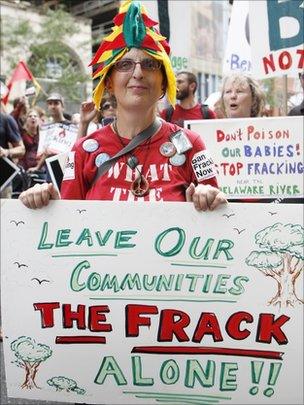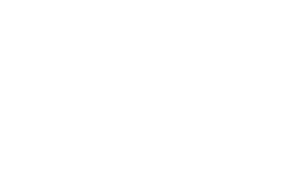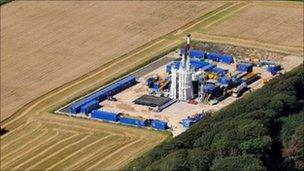New groups protest at shale gas
- Published

Fracking is controversial, with claims it could harm the environment
An increasing number of groups are being set up in the UK to oppose local plans to drill for shale gas.
The process, which is often called fracking, is controversial, with claims that it harms the environment.
Several groups of campaigners recently took part in a camp to protest against drilling in Lancashire, whilst a separate group marched against proposals in Cowbridge in South Wales.
But what is inspiring people that have not been involved in environment campaigns to start protesting about this?
"Like the campaign against the third runway at Heathrow airport, fracking is something that worries more than just people local to where the drilling could happen," says Philip Mitchell from the Green Party in Blackpool.
Despite his party membership, he says he had not previously been on an environmental protest until the recent camp: "I am concerned that, like in America, fracking could impact on communities and the countryside," he says.
Fracking is the process of using high powered jets of liquid containing chemicals to break up underground rock so that it releases natural gas for fuel.
It's hoped that it could provide a secure source of energy in the UK, which is a key part of the government's energy policy.
But drilling in Lancashire was suspended earlier this year after two minor earthquakes near Blackpool in June, and in the US some householders near drilling sites claim the chemicals used and the gas it releases pollutes local water, and can even cause it to ignite.
Job creation
Cuadrilla Resources, a company carrying out Hydraulic Fracturing in the UK, says its techniques are well tested and safe.
They say producing more gas in the UK will lower the cost of energy for consumers in a time when importing fuel is expensive, and that trying to find shale gas and then exploiting it will create thousands of jobs.
Exploration in Wales suggests there could be £70bn worth of gas stored in underground rock.

Gas is a natural by-product of shale rock
But campaigners claim more than a hundred people attended "Camp Frack" in Banks, Lancashire where Cuadrilla Resources is carrying out test drilling.
Amongst them was Allie Connolly, who travelled almost 300 miles from his home in Brighton to take part.
He says as well worrying about the possibility of immediate damage, "fracking is scraping the bottom of the fossil fuel barrel when we should be developing alternative sources of energy".
Connolly set up a website called frack-off.org.uk last summer, and says he can imagine the spread of the shale gas industry around the country.
"There are a lot of people that feel very strongly about this, and there are new groups popping up all over the place to oppose plans for drilling".
At the moment there are planning applications for exploration north of Woodnesborough in Kent, for the Llandow Industrial Estate in South Wales and an application to extend drilling at the Preese Hall Well in Lancashire.
Exploratory drilling
On the same day as Camp Frack started, protestors marched past Cowbridge town hall in South Wales against a proposal for exploratory drilling for shale gas on the Llandow Industrial Estate.
Vale of Glamorgan Council is considering an application by Eden Energy and Coastal Oil and Gas Limited, and have held a special meeting for residents to voice their concerns.
A decision on the plans is expected by late September, but permission has already been granted for exploration near Maesteg in the Vale of Glamorgan.

Cuadrilla says it has discovered vast reserves at a site in Lancashire
Louise Evans runs Llandow Caravan Park, which is a mile away from the proposed exploration site.
She was so worried about the impact it could have on her business she set up the group "The Vale Says No", which is her first foray into environmental campaigning.
The group recently held a meeting to explain their concerns to local people, Louise says more than 200 people came, and many of them had never been part of a protest group before.
"Many of them were older people - not stereotypical environmental campaigners. We're worried about the impact fracking will have on the countryside, and that if the land becomes contaminated it could harm farming and might drive away tourists," she says.
There are calls for the Welsh and UK governments to establish a policy on shale gas exploration, although MPs on the Energy and Climate Change Committee rejected safety concerns and recommended that drilling be allowed.
But with Cuadrilla Resources claiming there is 200 trillion cubic feet of gas in shale under the Bowland Basin in Lancashire which could provide power well into the future, as well as its extraction possibly creating more than 5,600 jobs, the controversial issue of fracking is likely to be with us for some time to come.
- Published21 September 2011
- Published16 September 2011
- Published24 May 2011
- Published28 March 2011